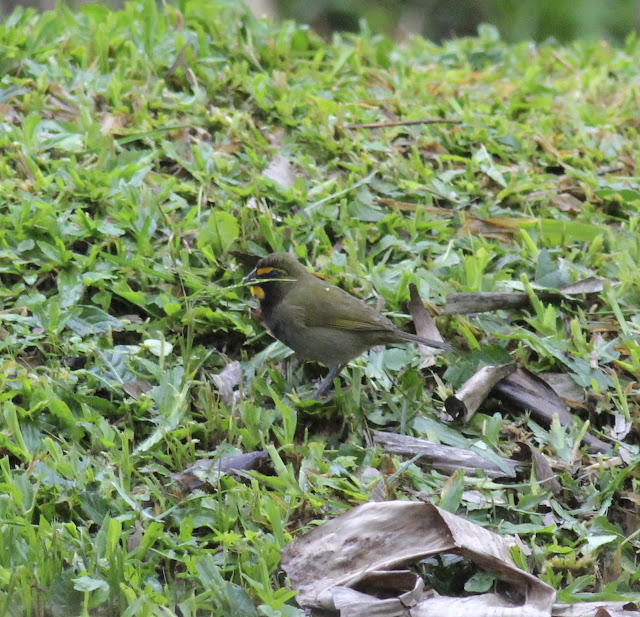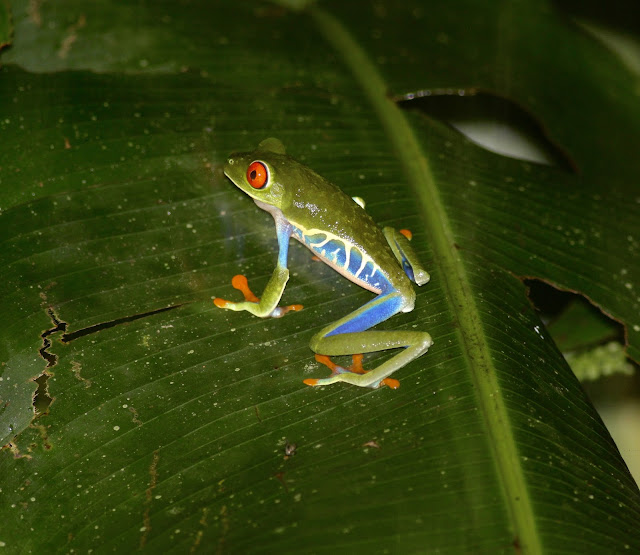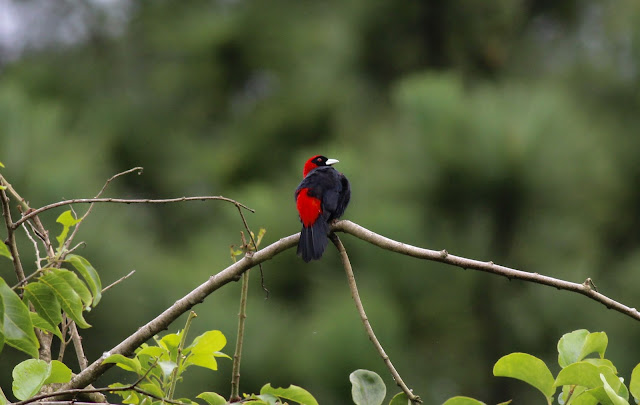Driving in Costa Rica is not a problem for me. The countryside is so beautiful that I actually enjoy it. That being said, it was raining on our way from Poas to Arenal. A little past Cinchona which was the site of a bad earthquake years ago which completely wiped the town out, there was a bad mudslide in the road so we decided to make a beeline to Arenal and not make any stops which was tough considering all the bird life on the sides of the road.
Yellow-throated Toucan, also known as Chestnut-mandibled and also known as Black-mandibled Toucan. This was one of the only stops we made.
After picking up some supplies in La Fortuna we headed up the country road to the Arenal Observatory Lodge.
This Gray-headed Chachalaca flew by the car and we did not stop as we reasoned that we would see a ton throughout the trip. This ended up being the only one.... Let this be a lesson to you. If you see a bird you want to see, stop and look at it. Birding with my family in the car is not easy.
White Hawk - what a great bird. After seeing this in the first 5 minutes on the entrance road, we knew that over the next several days we would be drowning in lifers.
While the ladies checked in I made my way over to the platform feeders. Geri-birding at it's best.
Red-legged Honeycreeper - this bird almost sent me into catatonic shock.
Green Honeycreeper in foreground, Red-legged in the background.
Male Great Curassow
Just when you think Red-legged Honeycreepers could not be more crippling, they show you their wings.
Great Kiskadees were everywhere...
Common Tody-flycatcher
Female Passerini's Tanager - the males are so crippling that my camera sensor refused to take a decent picture. Not only was my mind blown, but my crusher was also struggling to process the color.
Gray-headed Flycatcher - similar looking to a Social, but the head is gray instead of black and white.
Chestnut-sided Warbler - There were plenty of North American migrants too.
Variable Seedeater
Gray-crowned Yellowthroat
Golden-winged Warbler - I like to think maybe I saw this guy in Wilmington during migration this fall.
Good luck trying to ID empidonax flycatchers when on wintering grounds. My guess is this is a Traill's complex bird (Willow/Alder).
Rufous-tailed Hummingbirds are the most common HBs in Costa Rica and probably one of the most gregarious. They are constantly chasing each other and other HBs.
Passerini's Tanager - I am really upset at myself for not taking a better picture of a male Passerini's Tanager. The problem was they were everywhere and so I kept passing them up for other potentially new birds and then the trip was over and I had zero decent pics of them. There is something about the colors on this bird that my camera sensor did not like and all the photos came out bad. The horrible lighting didn't help.
Olive-backed Euphonia
Stripe-throated Hermit - I don't think this species ever visits feeders and it also tends to only feed deeper in the jungle so I was lucky to see this one next to a fence. I did see a few throughout the trip but never for more than a second and never allowing a decent camera shot.
Great Kiskadees were more obliging.
They would catch an insect and then bash the insect against the fence to stun or kill it before eating.
Keel-billed Toucan - toucans tended to stay up high and we almost had no sunny days so all the shots required me to crank up my AV settings really high and hope for the best.
It was hard but I finally made it to Phil's Villa where we stayed the next 3 nights. It was a really plush place off on it's own. Close enough to make it a short walk to the rest of the lodge but far enough to feel secluded. The view was insane when it wasn't clouded over which was almost the whole time. The volcano was so close that even though you couldn't see it most of the time, you could FEEL it. The palpable sense of imminent danger and ridiculous beauty combined to make me feel alive. Check out the website here for pics of the property that will do more justice than mine.
https://www.arenalobservatorylodge.com/rooms/phils-villa
The only negative, the ceilings were high and there was no rugs or anything on the walls to dampen noise so when the 4 cousins were playing it was a veritable cacophony.
A true Bird of Paradise on the swinging bridge that connects the main Lodge to the rooms.
Luke looking nervous
During the rain, which was constant, we did some quality geri-birding from the balcony overlooking the platform feeders.
Can you name all the species in this pic? RL Honeycreepers, Green Honeycreepers, Passerini's Tanager, Golden-hooded Tanager, Palm Tanager, Emerald Tanager and Baltimore Oriole.
Emerald Tanager with a couple honeycreepers.
Montezuma Oropendola - a very strange bird which also did not cooperate with my camera's sensor even when the light was good. They have high hanging nests which resemble a Baltimore Oriole's nest but on a much larger scale.
This Scarlet-thighed Dacnis was a brief sighting and I never saw another. In hindsight I would have made a better effort to crush it but I thought it was going to be plentiful. I need to study up on the less common birds next time so I know where to focus my crushing efforts.
Blue-gray Tanagers are more common and I crushed one properly later in the trip.
Black-striped Sparrow
Green Honeycreeper male
Violet-headed Hummingbird - I didn't notice any hummingbird feeders at Arenal which is a bit of a moldy swizz but there was plenty of Lantana and Porterweed which is really more of a pretty flower than a weed.
Buff-rumped Warbler
Ochre-bellied Flycatcher on nest.
Yellow-faced Grassquit
Green Kingfisher
Tufted Flycatcher
Gray Hawk - it was really raining at this point and I only took the camera out of my jacket when I could find a shelter or large tree to get under.
White Hawk
Red-lored Parrot
Purple-crowned Fairy female
Buff-rumped Warbler
Great Kiskadee
Band-backed Wren - this was the adult and he was molting his tail. I only kept the photo because it was diagnostic with the spotting on the breast.
The juvenile Band-backed Wren was very confusing and I would have been stuck if I had not seen the adult. You can tell its a juvenile by the grumpy look it has. Juvenile birds have pliable gapes (corner of beak) that tends to make them look old and grumpy.
Poor birds, they were all molting something fierce, this one's tail looked so ratty.
Gartered Trogon
We had tons of swifts and swallows flying way up high but the horrible backlighting made it very difficult to ID any of them. The really big ones were probably mostly White-collared Swifts.
This heavily cropped and lightened photo helps to be able to just make out the white collar.
This is what a Red-eyed Treefrog looks like when its sleeping in the day time. In the night time they bloom into a ridiculously colorful frog.
Brilliant Forest Frog
Collared Aracari
Brown Jays
Collared Aracari
A couple of North American migrants - Tennessee Warbler and Baltimore Oriole.
Brown Jay
Montezuma Oropendola
Tennessee Warbler
Palm Tanager
Lineated Woodpecker - I never did get an unobstructed view.
So the Costa Rican guide I was standing next to (not my guide) called this a Yellow-rumped Warbler and said it was rare for Arenal. I believe it is actually a Cape May which is also rare. Maybe he was looking at another bird. This one had extensive yellow in tertials and the rump was more olive than yellow.
Two-barred Flasher
Gray-capped Flycatcher
Rufous-tailed Hummingbird
Collared Aracari
Tropical Kingbird
I believe this is a False Postman, I had no idea there were so many different species of butterflies in Costa Rica, it is very difficult to find the correct ID.
Golden-hooded Tanager
Brown Jay
Male Great Curassow
Male and female Red-legged Honeycreepers
I tried my best to get some decent pics on natural perches. The feeder shots are definitely not ideal.
Shining Honeycreeper and Golden-hooded Tanager
Shining Honeycreeper is apparently fairly uncommon at Arenal. Easy to ID once you see the legs. This is a female.
Yellow-throated Euphonia - euphonias are fun to ID, there is a handful that look very similar but can be identified by keying in on some small difference.
I am not usually one for "combo" shots but this one was exceptional.
Another shot of the Cape May
Black-cheeked Woodpecker
Orange-chinned Parakeet
You can just make out the orange chin here.
Green Honeycreeper
On the last full day we took a hike down a jungle trail that was punishing and had very little birds. But finally just before we finished, we had two good birds in a clearing.
Rufous Mourner - apparently this species can only be told reliably from Rufous Piha by its call. We played both and it seemed to respond to Mourner. I showed a guide later and he agreed it was probably a Mourner based on habitat but he said it would be difficult to ID for sure.
Broad-billed Motmot
The tail sweeps back and forth like a metronome, so cool.
I think this may have been a Plumeleteer but was not able to confirm.
Patilla Clearwing
Unidentified Myiarchus flycatcher with strange pigment issues.
Long-tailed Tyrant - one of the coolest birds the whole trip.
Scaly-breasted Hummingbird - you can just barely make out the white edging on the outer tail feathers.
Southern Rough-winged Swallow
If the buffy colored throat did convince you, check out that light colored rump!
Tailed Cecropian - another butterfly that took me forever to ID.
Another view of the Scaly-breasted HB.
Common Tody-flycatcher
Yellow-faced Grassquit
Short-tailed Hawk
Dusky-capped Flycatcher
My sister in law treated us to a half day at Tabacon Spa and Resort to bathe in the thermal hot springs and have a nice lunch. I didn't find any birds there but it was kind of nice to put the camera down for a bit and just relax. It's hard being a birder.
These Plumed Basilisks loved the hot springs. This was a female or immature.
The male.
Also known as the Jesus Lizard for it's amazing ability of running across water.
Howler Monkeys - not as prevalent as they are in Mal Pais but we did find a couple groups.
On the last night my younger brother and I took some of the kids to look for treefrogs in the jungle. I had no idea that flash photography was apparently not good for the frogs, I found out later in the trip. My fixed 400 lens prevents me from getting closer than 20 feet so I think my flash probably did not hurt these frogs and toads. After I learned that flash is not good I stopped using any flash at all. Now that I am home I have researched this a bit, it seems the science is not out on whether flash is in fact bad for them. I believe the guides just say it so that people don't overuse flash and scare all the frogs away from the ponds where the guides go. Either way it is probably not a good idea to do it close range.
I believe this is a Cane Toad.
Yellow Treefrog?
Red-eyed Treefrog
Brilliant Forest Frog
Hourglass Frog?
We tried spotlighting and using flash on Common Paraques and this was the best shot I got.
Last morning we had a couple hours to say goodbye before we headed to our next destination at Sarapiqui on the Caribbean slope. By the way, the hurricane was never bad for us. The rain was inconvenient and constant but the wind never got bad. Only 40 miles North a bunch of Ticos got flooded out and a handful died so it was no joke but we were lucky.
Crested Guan
Rufous-tailed Hummingbird
Brown-hooded Parrot
Pale-billed Woodpecker
Crimson-collared Tanager
Banded Owl-butterfly
Great Curassow chick.
I agonized hours over this one but I believe it is an Emerald-patched Cattleheart.
The white edging in the scalloping is what convinced me.
Masked Tityra
Cinnamon Becard
Hmm, this was probably a Tropical Kingbird but maybe could be a Western. The yellow was not intense past the lower breast.
This Variegated Squirrel was munching away on leaves as I openly wept. I hope I am able to come back to Arenal soon. Still plenty of species for me to find. I think the rainy weather kept our numbers way down but maybe that is a good thing as I almost had a heart attack as it was. Some expert local entered a checklist for the day after we left Costa Rica (Christmas count?) for 143 species in one day!! We only had 170 for the whole trip. That being said, the experts can rattle off dozens of species at dawn based on songs alone. We IDed all ours ourselves on visual confirmation only.
I am traveling for work this week so Installment 3 of my Costa Rica trip will have to wait until next weekend. I hope my dedicated blog readers will be able to cope.




























































































































































Just wanted to leave a note to say I have been reading for ages and am absolutely loving the Costa Rican installments. I shall do my best to be patient.
ReplyDeleteThanks Colas! Installment #3 is being worked on now.
ReplyDelete